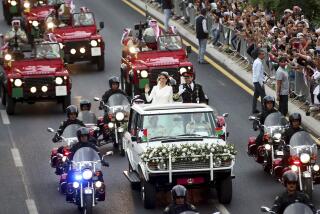Cars race in Bahrain Grand Prix as protesters march in villages
- Share via
CAIRO — Cars raced and protests echoed across the island kingdom of Bahrain on Sunday as the embattled royal family gambled on the Formula One Grand Prix to portray stability after more than a year of rebellion, mass arrests and hunger strikes.
One of the world’s premier sporting brands competed with the longest-running unrest in the “Arab Spring.” Human rights groups criticized Grand Prix officials for allowing the nation’s minority Sunni Muslim rulers to revel in international prestige. But majority Shiite Muslims used the limelight to refocus attention on abuses that have been eclipsed by revolts in Syria and other countries.
The small kingdom became a map of startling contrasts. Sleek cars careened at 200 mph past fans from across the Persian Gulf at a desert track guarded by security forces and barbed wire. Well beyond the whine of engines, protesters marched and tires burned to the sounds of tear gas rounds in cordoned-off Shiite villages ringing the capital, Manama.
Bahrain, a Washington ally and home to the U.S. Navy’s 5th Fleet, permitted sports journalists to cover the event but did not grant visas to many news organizations, including The Times. Dissidents relied on the Internet to publicize the death Saturday of a protest leader and provide updates on the health of Abdulhadi Alkhawaja, a human rights leader on a hunger strike for more than two months.
“The regime will fail to mislead international public opinion in the long term,” Mattar Ebrahim Mattar, a former member of parliament from the Shiite opposition Wefaq party, said in a statement. “We cannot move forward if the regime is insisting to [ignore] problems instead of facing them. The current policy is based in denial, ignorance and providing excuses.”
At least 50 people have been killed since unrest inspired by uprisings in Tunisia and Egypt began in February 2011. The turbulence led to the cancellation of last year’s Grand Prix. Bahrain’s ruling Khalifa family, which has introduced limited reforms, was intent that this year’s event would proceed.
The kingdom assured Formula One teams that demonstrations would not disrupt the race, which was won by Sebastian Vettel and estimated to have had a worldwide television audience of about 100 million. Safety worries, however, left the track’s stands nearly half-empty.
Bahrain, like most Arab Persian Gulf states, craves global legitimacy, even as it stands against the changes sweeping the region. It is enamored with the allure of multimillion-dollar race cars and accompanying Red Bull and Hugo Boss sponsorships, but rejects Western-style freedoms.
“State violence against those who oppose the Al Khalifa family rule continues, and in practice, not much has changed in the country since the brutal crackdown on antigovernment protesters” began, according to a recent Amnesty International report.
The report says that holding the Grand Prix “risks being interpreted by the government of Bahrain as symbolizing a return to business as usual. The international community must not turn a blind eye to the ongoing human rights crisis.”
Shiites, who make up more than 65% of Bahrain’s population, have long complained of marginalization. The Khalifa family alleges that protests have been instigated by Shiite-dominated Iran to stir trouble in Arab states. This led neighboring Saudi Arabia to send troops to Bahrain last year to quell demonstrations and stem unrest from spreading to Saudi Arabia’s restive Shiite minority.
Bahrain did call for an international independent investigation into the deaths and allegations of torture during protests. The inquiry found police used excessive force and violated human rights. The kingdom enacted some reforms, but talks with Shiite leaders have stalled.
In a statement Sunday before he attended the race, King Hamed ibn Isa Khalifa said his government was working toward a resolution: “I also want to make clear my personal commitment to reform and reconciliation in our great country. The door is always open for sincere dialogue amongst all our people.”
But rights activists blamed a crackdown over the weekend for Saturday’s death of Salah Abbas, who was reportedly shot in a village outside the capital. Authorities said they were investigating, and urged citizens to stop relying on “rumors spread through the social media.”
More to Read
Sign up for Essential California
The most important California stories and recommendations in your inbox every morning.
You may occasionally receive promotional content from the Los Angeles Times.











